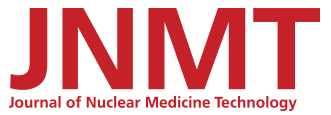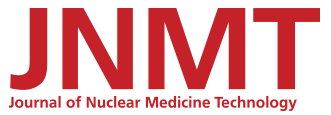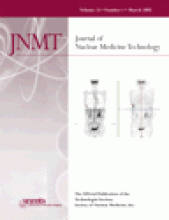
Kathy Thomas
The year 2004 will be remembered as a time of change and new beginnings for the Nuclear Medicine Technology Certification Board (NMTCB). It included the approval and adoption of the following policies and ethical standards:
Continuing education policy;
Disciplinary policy;
SNMTS Code of Ethics; and
Exam application reactivation policy (limiting the number of times an individual may sit for the entry-level exam after receiving a failing score).
We administered the entry-level and nuclear cardiology exams and successfully completed the first administration of the PET exam. The entry-level exam continues to demonstrate an increased number of candidates sitting for the exam. From 1996 to 2003 there was a 98% increase in the total number of candidates sitting for the entry-level exam. This trend is anticipated to continue, as enrollment in nuclear medicine programs remains high. The fourth administration of the nuclear cardiology technologist (NCT) exam to 182 examinees resulted in 107 newly certified NCTs (pass rate ∼ 59%). The first administration of the PET exam to 203 examinees resulted in 105 newly certified PET technologists (pass rate ∼52%).
A new vendor has been selected to administer the specialty exams. ACT, a world leader in computerized testing and the administrator of the NMTCB’s entry-level exam from the time it was computerized, has been contracted to administer the NCT and PET exams beginning this year.
The NCT exam has been accepted by the American Registry of Radiologic Technologist (ARRT) as equivalent to 24 hours of continuing education (CE). The PET exam has been submitted to the ARRT for CE recognition.
The NMTCB is currently pursuing accreditation from the National Commission on Certifying Agencies (NCCA) for the entry-level exam. Accreditation will enable the NMTCB to be recognized as a qualified credentialing organization for nuclear medicine technology when the CARE Act is passed.
This year promises to offer new challenges as the NMTCB begins implementation of policies and procedures approved in 2004 and continues its work on the entry-level and specialty exams.
Last year minor modifications and changes to the NMTCB’s policies and procedures were approved. Certificants are encouraged to visit the NMTCB Web site at www.nmtcb.org for the most up-to-date information regarding these changes. Additionally, the most current exam information, including revised 2005 applications, qualifications, and testing dates, can be found on the Web site.
The Board continues to solicit new items (questions) for the entry-level exam. Please contact the NMTCB office or visit the NMTCB Web site at www.nmtcb.org if you are interested in writing items for entry-level examinations.
The Board also continues to solicit ideas, suggestions, and item writers for the NCT and PET exams. The many suggestions made by examinees and the nuclear medicine community continue to be incorporated into the creation of the next exams. Interested NCT and PET certified technologists are strongly encouraged to actively participate in the creation of future exams by submitting new items to the NMTCB office. Through your participation, specialty examinations will be clinically relevant and will meet the expectations of the imaging community. If you are interested in writing items for the 2005 exams, please contact the NMTCB office or visit the NMTCB Web site.
Radiologic technologists, RT(R) or RT(T), will be eligible to sit for the PET exam providing they meet the clinical experience and didactic requirements as described on the NMTCB Web site. Seven hundred hours of clinical experience must be performed under the direct supervision of a certified or registered nuclear medicine technologist and the supervision of a nuclear medicine physician or radiologist. Didactic education must include 15 contact hours of coursework in the following areas: radiopharmacy, nuclear medicine instrumentation, and radiation safety.
Call for Directors. The NMTCB is seeking applicants to serve on the NMTCB Board of Directors (BOD). This is an excellent opportunity to become involved in one of the more challenging areas of your profession—establishing standards of competency. The term of office for this position is 4 years, with an opportunity to serve one additional 4-year term. Responsibilities include attending the annual spring and fall BOD meetings, actively participating in the preparation of the entry-level, NCT, or PET exam, and serving on one or more of the committees of the Board. Interested CNMTs should contact the NMTCB’s executive director, Dr. Bhaskar R. Dawadi, at 800-659-3953 or drdawadi{at}nmtcb.org, for an application. Completed applications received by August 1, 2005, will be reviewed at the fall BOD meeting. The new 4-year term of office will begin January 1, 2006.
I am always available to answer your questions or discuss your comments or suggestions. Please feel free to contact me at ksthomas{at}earthlink.net.







